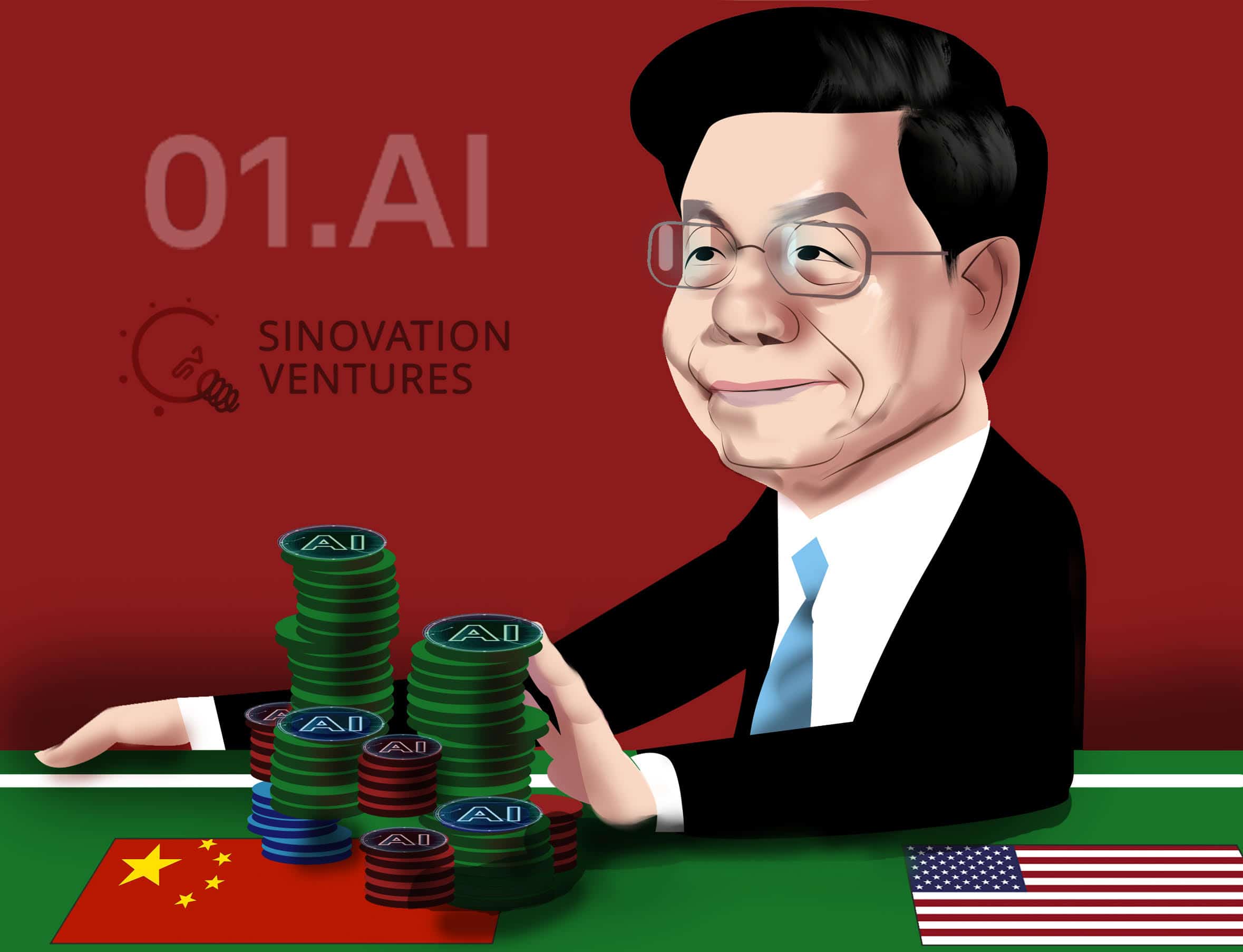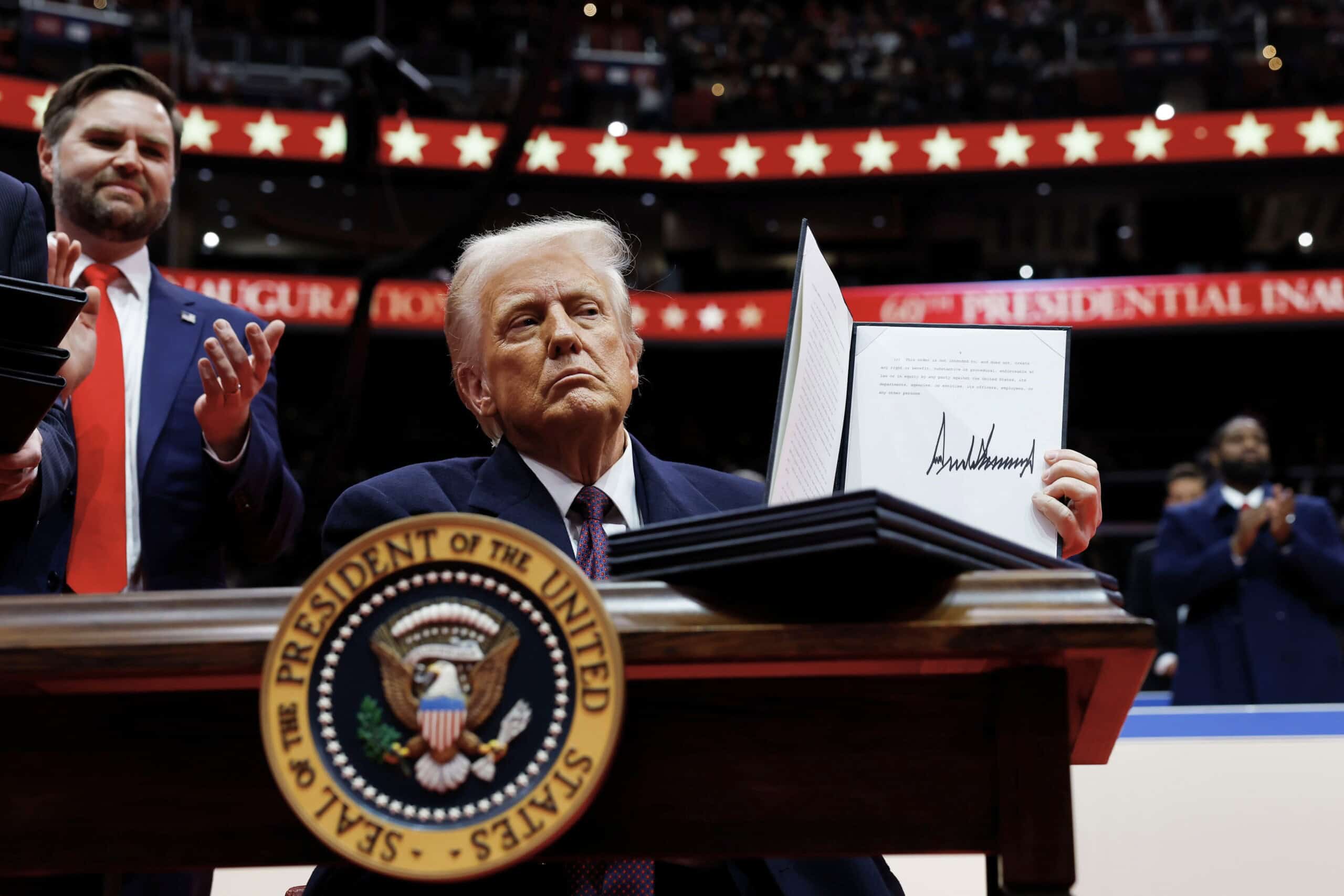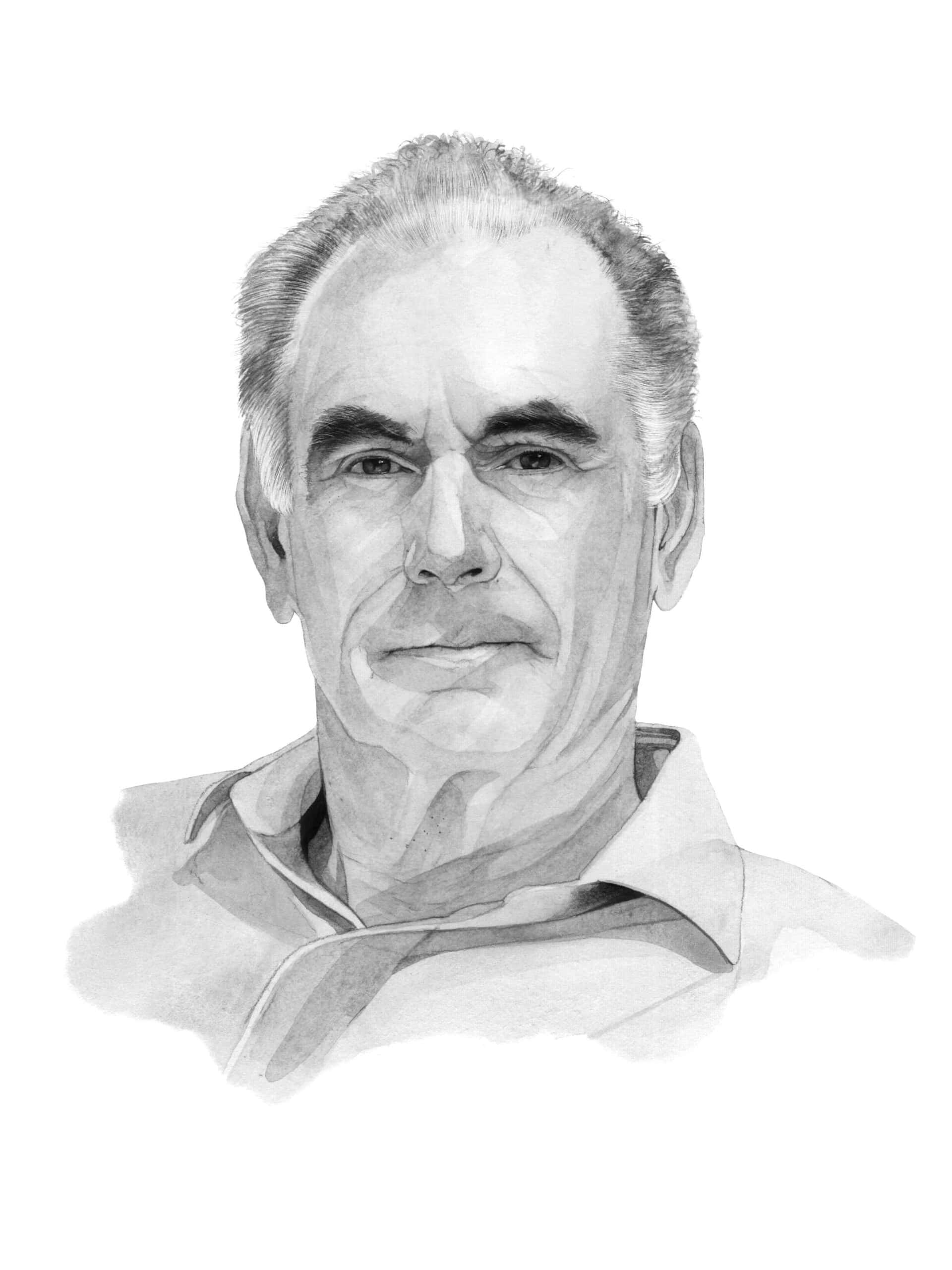H. R. McMaster served President Trump as the nation’s 26th National Security Advisor in 2017 and 2018. A retired Lt. General in the U.S. Army with a PhD in American history from the University of North Carolina at Chapel Hill, McMaster served in the Gulf War and was recognized for his roles in Operation Enduring Freedom and Operation Iraqi Freedom. His first book, Dereliction of Duty, about U.S. failures during the Vietnam War, was a New York Times best seller. His new book, Battlegrounds: The Fight to Defend the Free World (Harper), deals partly with the challenges the country faces with China. In “How China Sees the World,” an excerpt from his book published last May in the Atlantic magazine, McMaster wrote about accompanying President Trump on a visit to Beijing, a visit he said convinced him even more that a dramatic shift in American policy towards China was overdue. What follows are lightly edited excerpts of our discussion.
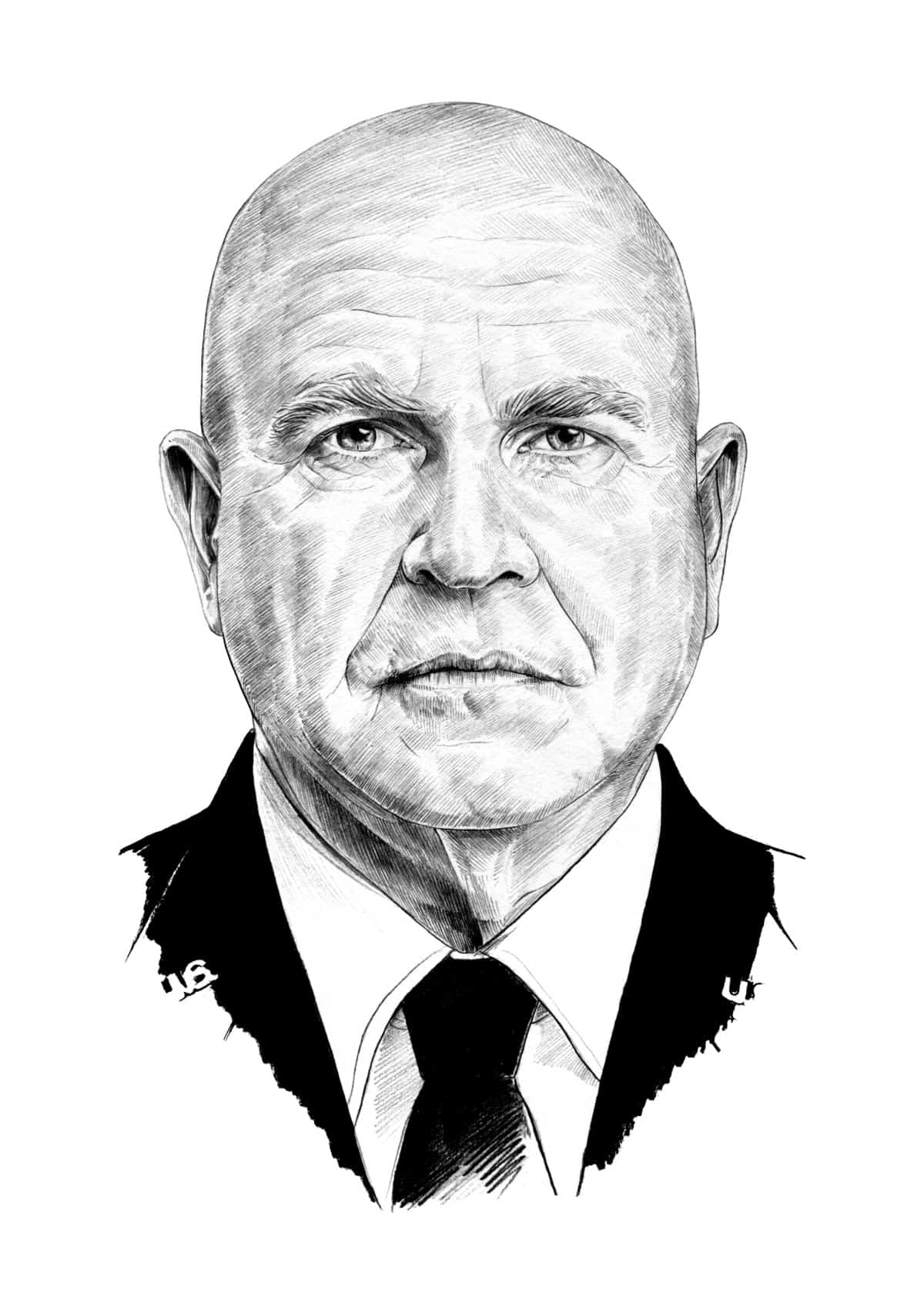
Illustration by Lauren Crow
Q: General McMaster, how would you characterize the challenge we face with China today? Is this the most important challenge that the U.S. faces today?
A: Yes, I think it is, because it’s a dangerous competition. But it’s also a competition that has big implications for our security, our prosperity and our influence in the world. It’s a competition that could also result in a positive outcome, both for China and the United States, if it’s managed well; and if the Chinese Communist Party leadership concludes that the path they’re on is unhelpful — not only for the Chinese people, but even for the Party. So the stakes are very high.
You write in your book that China is promoting a closed, authoritarian model and even exporting it to other parts of the world. When did this become apparent to you or to others in the U.S. military or the federal government?
It became apparent in 2017, for sure, with the beginning of the Trump administration. [That’s when we undertook an] effort to really subject all elements of our foreign policy to scrutiny, and to examine the assumptions that underpin previous policies — and to test those assumptions. [We also] tried to understand the complex challenges on their own terms, and to look at things from the perspective of the other side, from what [the scholar] Zachary Shore calls “strategic empathy.” And in this examination, we came to the inescapable conclusion that China, when you look in aggregate at their actions internationally, from a diplomatic, economic and U.S. military perspective, was attempting to establish servile relationships with countries [in order] to use those relationships to achieve primacy across the Indo-Pacific region. And they were doing [this partly] to challenge the United States globally. I write about this in Battlegrounds, this co-optation of companies and countries, using these economic relationships and dependence on China to coerce countries to support China’s foreign policy goals. Where China is most successful is when there’s a corrupt, authoritarian government in place. They can help the leadership in Zimbabwe, for example, adopt a version of their technologically-enabled surveillance police state.
If that’s so, why wasn’t this recognized by previous administrations? Why didn’t the Bush or Obama administration see this, or is it that this only really ramped up after Xi Jinping came to power in 2013? In your book, you suggest that the U.S. only recently came to this conclusion.
We did. I think it goes back to the end of the Cold War. There’s a story I tell in the book about how optimism led to complacency in the 1990s, and a sense that victory in the Cold War meant that ideological competition was over. There was no longer going to be a Great Power rivalry. That was a relic of the past. President George H. W. Bush said we now have a New World Order, and it’d be the rule of law instead of the jungle. And that complacency in the ’90s, then in the 2000s, became over optimism. There are [still] those who spend time arguing that the strengthening of the Chinese Communist Party is inevitable, and we ought to just mainly manage our [America’s] decline; that we disengage from complex competitions. And underpinning all of that, across that period, was wishful thinking that was typified by [Deputy Secretary of State] Bob Zoellick’s speech [in 2005]. He was critical of certain China policies, but held out this hope that he and some others continue to cling to that China, under the Party, will become a responsible stakeholder and uphold the international system when, in fact, the Party is actively subverting it and trying to replace it with a new system that is sympathetic to Chinese interests.
Do you think this was the plan all along or did something in Beijing change in recent years? Are you suggesting China never really intended to play by the rules?
Under Deng Xiaoping, China’s only path to strength and to regaining its place in the world, from the Chinese perspective, was through opening up and the reforms that were put into place in the 1980s, and especially the ’90s. But shortly after the financial crisis in 2008, there was generally a rejection of that belief, and now it’s more about how their Communist system is superior to our free market economic systems; that China’s authoritarian governance, its mercantilist approach to economic discourse and trade and commerce is superior. So it began under [Chinese President] Hu Jintao, this rejection of reform as the path. Then came Xi Jinping, and because of the corruption in the system, corruption in the Party, [there was this] fear of losing control as the private sector in China gained influence. There were cracks in the Great Firewall of information, or I should say, the Great Firewall was not fully constructed. And so Xi has embarked on this path of doing everything possible to extend and tighten the Party’s exclusive control, to control power.
If we go back to the Obama administration, I was told that in one of the early meetings between Obama and Xi Jinping that Chairman Xi proposed the two countries develop a new type of great power relationship and perhaps each side would have different spheres of influence in the world. I have not confirmed that this took place, but is it something that you’ve heard or are aware of?
Yes, I’ve heard that as well. And, of course, that fits into the Chinese leadership’s use of the phrase, “a new kind of great power relationship.” This idea of a G2. And of course, we [in the Trump administration] were very careful [in what phrases we used]. Unlike the Obama administration officials, we were careful not to use that phrase. They really wanted President Trump to adopt this language, so that they could then use such phrases to bludgeon other countries across the Pacific into submission. [They might be able to say], “If the United States has signed up for this program, you’re on our team now.”
| BIO AT A GLANCE | |
|---|---|
| AGE | 58 |
| BIRTHPLACE | Philadelphia, Pennsylvania |
| CURRENT POSITION | Fouad and Michelle Ajami Senior Fellow, Hoover Institution |
One of the striking things about your book is the comment you attribute to China’s prime minister, Li Keqiang, during your trip to Beijing with President Trump. You quote him saying that China “doesn’t need the U.S.” anymore, and that the U.S. would simply help supply some raw materials to the country. Why do you think he talked that way?
I think his comments were meant to preempt any idea that this new American administration under Donald Trump would have about demanding fair and reciprocal trade agreements. He basically said, “Hey, this is your future. We don’t need you anymore. We’re going to be the center of advanced manufacturing, and you’re going to provide us with soybeans, and maybe, if you’re lucky, some [liquified natural gas].”
Now, nearly four years after President Trump took office, how are things playing out? There’s been an aggressive push back, one might say, by the U.S. administration against China’s rise. How do you assess how that’s going? Is this administration doing the right thing, or is it too much or too little?
Well, it’s actually very much what we envisioned when we wrote the strategy. There’s this conventional wisdom that there’s no strategy, right? People say that: “Well, there’s no strategy.” But look at all these different initiatives on the part of the Trump administration. They’re joining with 12 other countries to indict individuals and entities associated with ATP. [The U.S. refers to ATP10 as a Chinese government-linked cyber hacking group.] They’re using trade enforcement mechanisms to demand fair and reciprocal trade and to remove barriers to entry to the Chinese market. A division within the Department of Justice is going to conduct counterintelligence investigations, and look at how the PLA is penetrating our research facilities. And, look at what they’re doing now with Japan in advocating transparency and international standards for infrastructure investment. They’re working with Japan and other countries to bring actions forward within the World Trade Organization. And there’s this group called the Quad [Quadrilateral Security Dialogue consisting of the U.S., Australia, Japan and India]. They’re working to promote a vision for a free and open Indo-Pacific. They’re sailing through the South China Sea with regularity and doing it with other countries. And they’re banning Huawei, and getting others to recognize the dangers of it. “Hey, they have no strategy,” (chuckles)… Well, what would you need? It’s not perfectly implemented. I would not have recommended steel and aluminum tariffs on our allies to get to China. I don’t understand how that works. But there definitely is a strategy that’s being implemented. And the members of the Trump administration who put it together deserve credit. You know, it was very Chinese of us that we had the four speeches. We had the director of the FBI, the attorney general, the Secretary of State, and [Secretary of] Defense all giving speeches on the threat posed to us and the free world.

Credit: Official White House Photo by Shealah Craighead
I’m sorry to go on, but there are three fundamental misunderstandings about the nature of the competition with China. And they’re really important for international audiences to understand and recognize. The first misunderstanding is that this is really not [just] a U.S.-China problem. You see, for example, how they handled Covid-19, and suppressed the news of human-to-human transmission; the subversion of the WHO; the cutting off of domestic travel before national travel; the punishment of the doctors who tried to blow the whistle on it. And then you compound that with this Wolf Warrior diplomacy, and the heavy-handed tactics. If people would then look at the bludgeoning to death of Indian soldiers, the [Hong Kong] national security law and the pressures created in Hong Kong, the aggressive actions in the South China Sea, the militarization of the islands, the threat to Taiwan, and the massive cyber attacks on the U.S. and, especially, on Australia. This is not really a U.S.-China problem. It’s a free world-China problem.
The second misunderstanding is that the U.S. is just going in alone. There is a very high degree of international cooperation on this problem, even from the Europeans. China is a systemic competitor. Germany is having second thoughts about the economic relationship. The UK too, and others are following suit. There’s a global adjustment going on with the risk to supply chains. So this is not an area where we don’t have international cooperation. There’s a high degree of cooperation.
And the third misunderstanding is: “What if we just cooperated with China, then things would get better?” (chuckles) Well, we tried that before. Xi Jinping can no longer get away with this language of “international cooperation,” and the “shared future for mankind.” Because he’s undermining international organizations. He couldn’t give a speech prior to Covid without saying the word “environment” 19 times and then everybody falling over themselves to embrace him. But the other side [of China] is poisoning the world with carbon emissions and constructing or financing over 200 coal power plants — not just in China but in Africa as well. They’re destroying whole ecosystems in the South China Sea, to build these weapons platforms there. The EU wanted to publish a report that called for an investigation into the origins of the [Covid-19] virus. And then they edited [certain stronger statements] out. They said, “Well, we need to maintain a good relationship with China and cooperate on these issues.” And they listed all these issues, but actually China is the major problem. It just seems like it’s wishful thinking, it’s cognitive dissonance in a lot of ways. They have no intention of “playing by the rules.”
Some analysts have argued that a lot of the China buildup in the last 20 to 30 years has been aided by American companies, moving manufacturing to China, sharing technology, setting up joint ventures with military firms, and even financing the country’s leading technology firms. This has long been considered a good thing; American companies often profited from it. Are you arguing that this was wrong? Are we now moving to contain China? After all, the scale of engagement has been massive.
It is massive. But I think it’s now irresponsible for U.S. companies — U.S. private equity or venture capital firms — to fund Chinese companies that are developing and applying dual use technologies. These are technologies that China is using to gain an unfair and preponderant position of advantage in the emerging global economy, but also to give the PLA a differential advantage over our military. You know, it’s astounding to me that any of this investment would continue. It’s the same argument, of course, for the potential delisting of Chinese companies on U.S. stock exchanges, which I think is also long overdue. And this is why it’s so important to educate people about the nature of the [Communist] Party and the differences in the systems. We treat their companies like U.S. companies, but they’re not U.S. companies, right? They [Chinese companies] have to, by law, act as an extension of the [Communist] Party. So we have to recognize that reality when we’re making policy. Companies have to do this on their own. There has to be a response across the private sector, because China doesn’t distinguish between their private sector and government. And they’re targeting our private sector in a way that’s meant to give their system, this oppressive system, a competitive advantage against us.
| MISCELLANEA | |
|---|---|
| BOOK REC | Personal Memoirs of U. S. Grant by Ulysses S. Grant |
| FAVORITE MUSIC | Motown/funk |
| FAVORITE FILM | Lincoln (2012) |
| MOST ADMIRE | George Washington and George Marshall |
Would you use the word decoupling? Do you think decoupling is where we should be headed? In any way?
Yes, but sensible decoupling. I would qualify that by saying that we want to recognize that China is not monolithic or homogenous. I’ve only been to Beijing one time, so I make these observations with a great deal of humility. I recognize I’m a neophyte and still a student of this. But we should try to maximize positive relationships with the Chinese people, and not with entities that are under the direct control or working for the Chinese Communist Party. We should shut down that space. We should offer more H1B visas to Chinese nationals. Employees of U.S. companies that are subjected to the coercion of the Chinese Communist Party — they ought to get special status and be able to come to the United States to get out from under the Party. A lot of times, we do things reflexively, like restrict these [visas]. We ought to have more and better interactions. I think we ought to have as many or more Chinese students. But we ought to make sure their experience is the kind of experience you want any international student to have. We ought to protect Chinese students against the coercion of the [Ministry of State Security] and these organizations, like the Chinese Students and Scholars Association, that are here to inform on these students and stifle their academic freedom. There are some really smart policies we can put in place that are counterintuitive. There’s an example that I use in the book that is powerful. After the Tiananmen Square massacre, President George H. W. Bush said, “Any Chinese student here in the U.S. can have a green card, and stay as long as you want.” And 58,000 took him up on it. And they are some of our most productive citizens today. There are so many successful entrepreneurs. So, we have tremendous advantages as a free and open democratic country, and we ought to take advantage of those and make use of our strengths.
The U.S. has seemingly switched from win-win cooperation to very heated rhetoric about the dangers of China. Do you worry about the consequences of that, or that this could lead to conflict or war?
I don’t think so. Please indulge me. Can I read a paragraph from the book?
Sure.
This is from the chapter on what to do about the problems. It’s called “Turning Weakness into Strength.” And the argument is that we should turn what China looks at as our weaknesses into strengths. So they look at participative government, right, and they say giving people a say in the government is a weakness; the rule of law is a weakness; and freedom of speech is a weakness. We ought to regard those as our strengths and protect them. And, in an introspective way, we out to address and protect them.
“The United States and other nations must counter the Party’s narrative that any accusations are meant to “keep China down” by containing it. Competing effectively with China, diplomatically and economically, as well as militarily, should be understood as the best way to avoid confrontation. In 2019, at an event in the Chinese Embassy, Chinese Ambassador, Cui Tiankai delivered a speech in which he portrayed the new U.S. approach towards China as an effort to arrest China’s rise and deny its people the promise of the China Dream. Matt Pottinger (who I think is doing a great job) responded in Mandarin with an explanation of the shift in language from cooperation and engagement to competition. He quoted Confucius’s doctrine on the rectification of names: “If names cannot be correct, then language is not in accordance with the truth of things. And if language is not in accordance with the truth of things, then affairs cannot be carried on to success.“
And the final line in this chapter is, “Competition should aim to convince Chairman Xi and the Party leaders that they can achieve enough of their dream without doing so at the expense of their peoples’ rights, or the security, sovereignty and prosperity of other nation’s citizens.” So I think competition is the best way to avoid confrontation. And the strategy of cooperation and engagement was actually emboldening China in a way that made confrontation more likely.
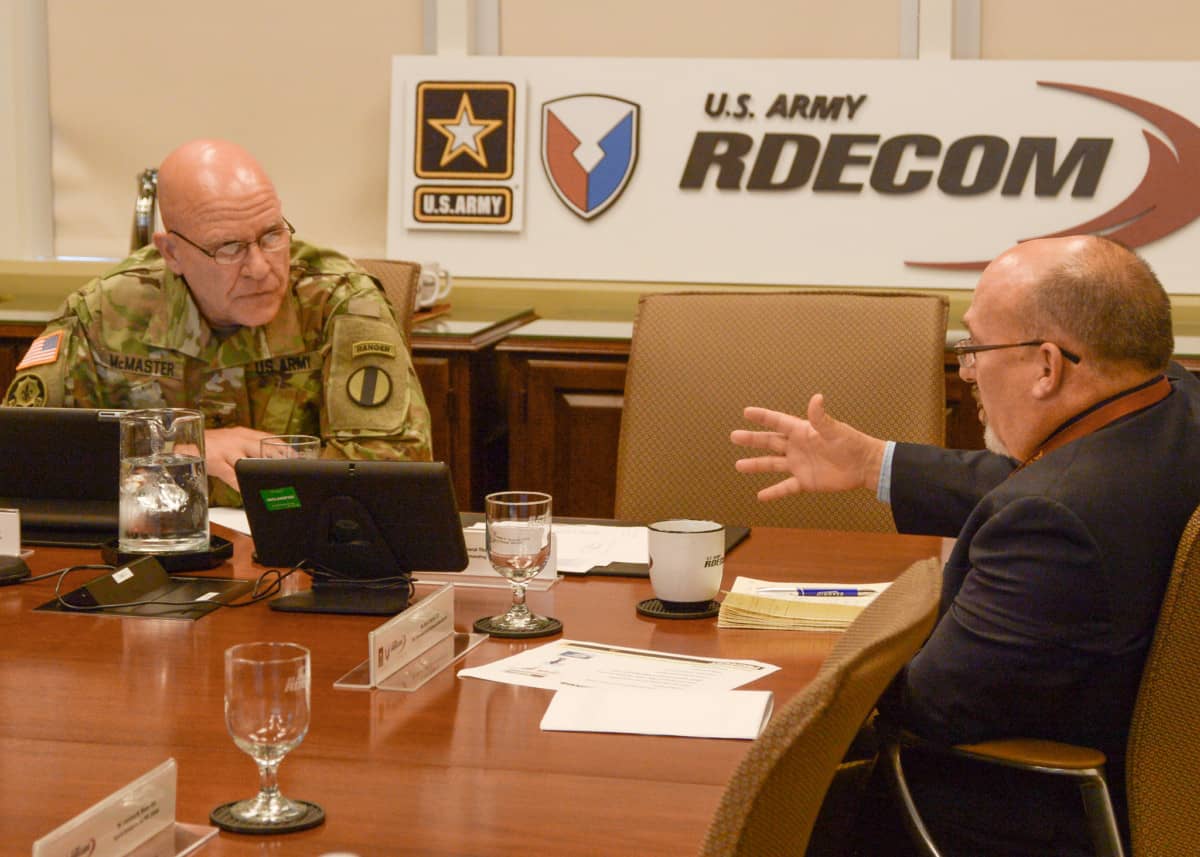
Credit: U.S. Army CCDC, Creative Commons
Let me return to that question. There’s talk of Taiwan, and whether there could be some incident or accident that leads to conflict. Do you worry about that?
I do worry about it. What if the PLA believes the Party’s propaganda? They’re one of the audiences for the Party’s jingoistic nationalism. They have this sense that, “Now’s the time. You have to take center stage and exercise the power.” Of course, this combination is not unprecedented. Remember what happened on Hainan island, with the EP3 [aircraft incident]. So I think the likelihood of that happening is pretty high right now. But it’s not because of anything that we’re doing. It’s because of what the Party has been feeding the PLA.
Do you have a sense of China’s military capabilities?
There’s a book that just came out recently called Kill Chain by Christian Brose, and he goes into a lot of detail and highlights what he sees as vulnerabilities in our joint force. The Chinese have been pretty smart about developing asymmetric weapons capabilities that seek to take apart our competitive advantages. But I’m still very confident in our capabilities. We can’t be complacent. We have to develop countermeasures. Military power is much more than just the weapons in an organization. It’s the training, the leadership, the organizational design, and the military culture. Ours is obviously one of initiative and decentralized operations and trust within organizations — very different from the PLA. We do have some very significant, less tangible advantages over the PLA. But you know, quantity does have a quality of its own. They’re building so many ships and aircraft that we ought to be concerned about it.
There are some signs though that they’re military has a phantom component, with the use of cyber warriors and even other agencies to engage and influence. Is that right?
Oh, absolutely. So I’m working here at the Hoover Institution [at Stanford University]. I’m supporting and participating in the “China’s Global Sharp Power Project.” We just released a report on this very topic. I wrote the foreword to the report on the penetration of research programs and facilities and how to counter it. And there’s an earlier study from John Pomfret, Liz Economy, and others on Chinese influence, and how it cut across the private sector, local government, and think tanks (chuckles). In the book, I described the three connected and overlapping strategies of civil-military fusion, which is kind of the umbrella under which they operate with “Made in China 2025” and then the “One Belt, One Road” initiative.
Does the challenge the U.S. faces in Russia even compare to this?
It’s a much greater challenge with China. You know, in their minds, China is developing the power to displace the United States. Russia knows it doesn’t have that power. Its economy is the size of the Texas economy. They’re a power and they’re dangerous, and they have a lot of nuclear weapons, but what Russia is trying to do is to drag everybody down. They want us to, in many ways, pull ourselves apart as a society and [damage us] in Europe and the transatlantic relationship. And so Putin’s theory of restoring Russia to national greatness is to be the last man standing. China’s is to actually take center stage, to use the language in the October 2017 speech that Xi made at the Party Congress.
While serving as national security advisor to the president, you were in meetings with the Chinese leadership. Did you get a sense of how they approached things from any of those meetings?
There was a certain degree of concern, because Trump is referred to as pretty unpredictable or unconventional. They were used to this policy of cooperation and engagement. Susan Rice [Obama’s ambassador to the U.N. and then national security advisor] even adopted the language that they wanted us to adopt. I’m not trying to criticize her, but it was just indicative of this adoption of their language. Remember, [President] Obama once said we have much more to fear from a weak China than a strong China. They were talking the language of cooperation, and all the while, [China was] operating very aggressively against us. I think [the Chinese leadership] wanted to continue that. They wanted to continue to have these dialogues that go nowhere. And so there was a great degree of concern [about Trump] on their part, but they were hoping they could convince us to continue the same approach.
Over the past year, so many people have expressed relief that the U.S. government and businesses are finally recognizing some of the darker aspects of the relationship with China. But others say the heated anti-China rhetoric could actually undermine the initiative, especially with it leading to anti-Asian or anti-Chinese sentiment. What do you say to those people?
Well, I think you always distinguish between the Chinese people and the Chinese Communist Party. You see that in the language of the administration, which I think is important. The other aspect of it is to overcome what I call in the book “strategic narcissism,” which is the tendency to define the world only in relation to us. And we think that we are the only causal factor for events and actions. In fact, China and the Chinese Communist Party have aspirations that go beyond reactions to our policies and our statements. And I think just showing what the Party is doing internally, for example, with this campaign of cultural genocide in Xinjiang or with the implementation of a social credit system, shows that this is not just a U.S. problem. To some extent, [there are] people who dislike Donald Trump enough that they begin to develop an affinity for Chairman Xi. And it doesn’t make sense.

David Barboza is the co-founder and a staff writer at The Wire. Previously, he was a longtime business reporter and foreign correspondent at The New York Times. @DavidBarboza2


